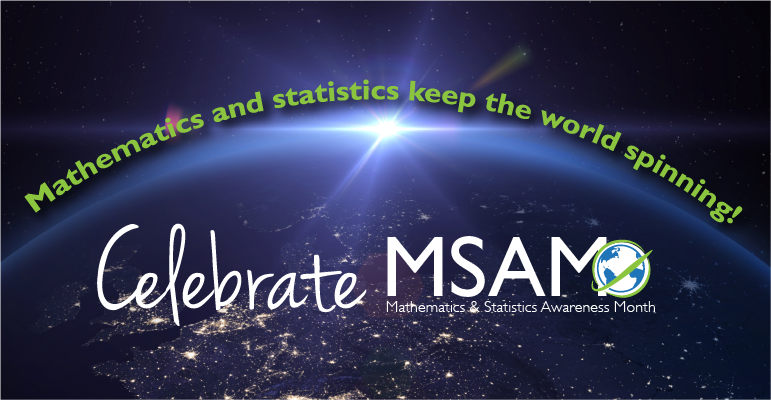Mathematics and Statistics Awareness Month

Activities
We encourage colleges and universities—and also high-school departments, institutional public information offices, math clubs, and student groups—and related associations and interest groups to organize and host activities in April for Mathematics and Statistics Awareness Month. Past activities have included workshops, competitions, exhibits, festivals, lectures, symposia, department open houses, math art exhibits, and math poetry readings. Some years, elected officials have issued proclamations, frequently in connection with special meetings and events arranged to observe the month.
This year, due to the coronavirus forcing schools to close and making it difficult to gather, we encourage you to celebrate mathematics and statistics on social media. Share your favorite math books, games, T-shirt designs, posters, news stories, videos, and research using hashtag #MathStatMonth.
Read about the origins of Mathematics and Statistics Awareness Month.
April marks a time to increase the understanding and appreciation of mathematics and statistics.
Why? Both subjects play a significant role in addressing many real-world problems—internet security, sustainability, disease, climate change, the data deluge, and much more. Research in these and other areas is ongoing, revealing new results and applications every day in fields such as medicine, manufacturing, energy, biotechnology, and business. Mathematics and statistics are important drivers of innovation in our technological world, in which new systems and methodologies continue to become more complex.
Basic research in mathematics is valuable in itself, but it often contributes to research in other sciences and has often, years later, led to discoveries that affect society today. For example, an encryption algorithm used today in e-commerce relies on results discovered in the 17th and 18th centuries, long before computers were invented. Mathematics has inspired some of the most stunning architecture and art.
In the age of big data, statistics underlies almost every decision made today, whether it's the effectiveness of a new drug or treatment or the debut of a new mobile device. Statistics is how analysts convert raw data into useful information, from studies of proteins to surveys of galaxies.
Research in statistics and the mathematical sciences is important for its applications and because it trains one in critical thinking and problem solving. From magic squares and Möbius bands to magical card tricks and illusions, mysterious phenomena with elegant "Aha!" explanations have been part of both subjects for centuries.
This April, let's celebrate mathematics and statistics and the diverse researchers and students in these fields who are contributing so much to furthering discoveries, solving problems, and finding beauty in our world.
Plan Events
Media Coverage Tips - How to increase local media coverage of your MSAM events.
The more you are able to provide a local angle (e.g., getting an MSAM proclamation from your mayor or governor, involving a local high school or college, etc.), the more likely you are to receive local coverage.
Collect Resources
Professional Societies
Contact these organizations for more information about mathematics, statistics, and careers in mathematics and statistics to share with your faculty, students, and visitors.
Use Social Media
@MathAware on Twitter—tweet and retweet theme-related resources and events using #MathStatMonth
On Facebook—follow Mathematics and Statistics Awareness Month and share events.